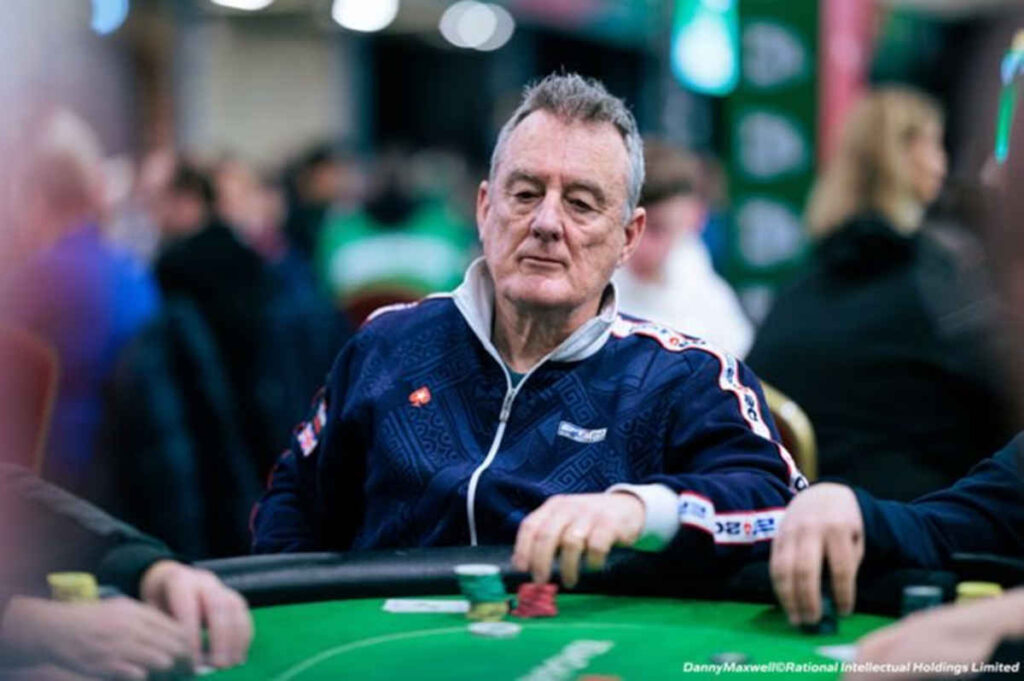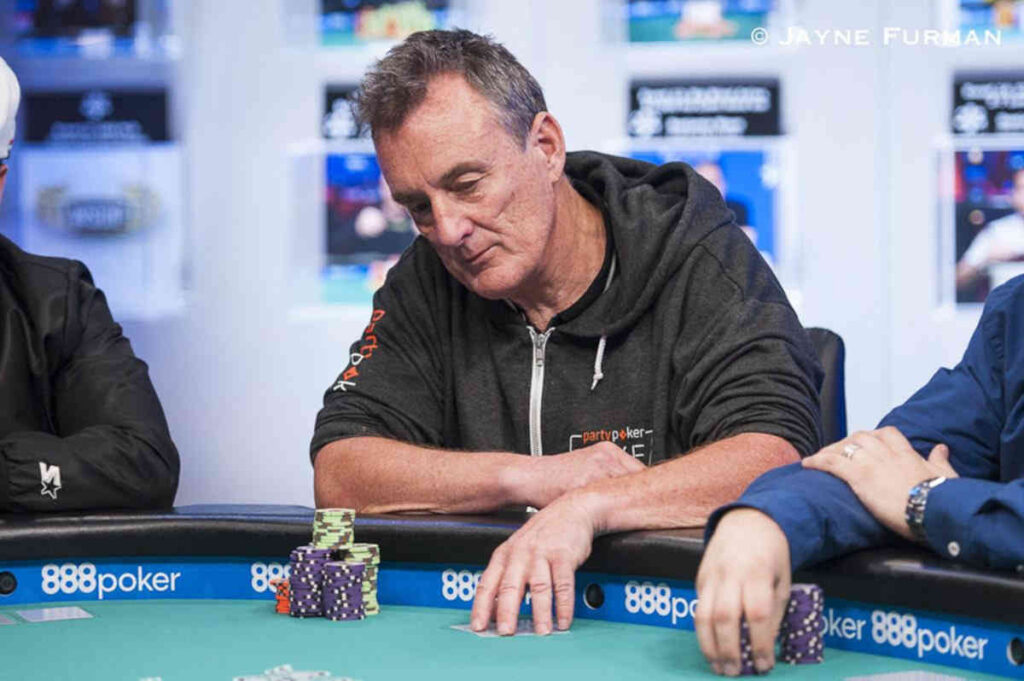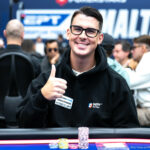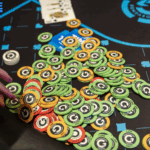Warning: Undefined array key "post_type_share_twitter_account" in /var/www/vhosts/casinonewsblogger.com/public_html/wp-content/themes/cryptocurrency/vslmd/share/share.php on line 24
Image courtesy of World Poker Tour
So far, in his 69 years of life, Barny Boatman has lived voraciously on and off the felt. In this installment of Inside the Poker Circles, we learn how Boatman has seen the game grow from small home games and local tournaments to a televised, sponsored, and international phenomenon.
Taken from the pages of Between the Blinds: Interviewing Poker Professionals (coming soon), Boatman shares his story: how he got into the game, the people who shaped him, and the adventures he has had on and off the felt. All this and more continues to make poker one of the most exciting and rewarding parts of his life.
You’ve been many things: a bartender, builder, English teacher, journalist, computer programmer, and a legal advisor who never lost a trial. Then, you became a poker player. Please tell us your poker story.
I was always a player of games, and I think I was a gambler for a long time as well. Even at school, we’d play a game called penny against the wall, and three-card brag at the back of the classroom. I had an uncle who taught me and my brothers and sister Newmarket, a card game with a gambling element. We played it at Christmas, so we always saw playing cards for money as a social thing.
I did a lot of jobs with no connection to games or gambling, but I did invent a few board games, which I had no idea how to market. I hawked them around, and one or two, it seemed to me, were copied without my getting credit.
I was no businessman. In the mid-nineties, I got involved, along with my sister, in a highly innovatory enterprise – Channel Cyberia. They were developing content in the very early days of the Internet and invited a few people to produce interactive ‘shows’ for the new medium.
I came up with something called ‘Play the Game’. Players would move around an interactive ‘board’, entering different spaces that had to do with myriad aspects of games and gambling. I was working as a mainframe computer programmer at the time. Old school. A smart young Aussie programmer brought the thing to life.
We were asked how our ‘shows’ could be monetized. I suggested bookmaking companies might be interested. One of the squares on the interactive board game featured something called Fantasy Punter’s League, which would use real odds supplied by a sponsor to play a competitive game. But it was way too early for all of it.

A lot of people made great content, about music, fashion, food… But we never raised the funds to get it off the ground. Still, in the back of my mind, there was this idea that the Internet would grow, and that games, gambling, and poker would be a part of it.
Getting into poker seriously came slightly later. My brother and I had had a friendly home game for a while, and we’d started playing in bigger games around London. It was getting so that the amount of money I’d win or lose in a night was more than I’d earn the next day programming.
I went to play my first ever tournament at the Victoria Casino, it was a £20 buy-in pot limit seven card stud event, and I won it! I got a couple of grand. The following week, I went back, played it again, and chopped it! I must have run so good, but I probably imagined I was some sort of genius. Anyway, it was enough to give me the tournament bug.
I played a lot of 7-card stud; that was the big game back then. I had my first international result in Slovenia, winning an event for £8,000. They gave me a huge comedy cardboard cheque for twenty-two million Lira and a beautiful trophy.
This was the most money I’d ever seen, and I decided to take a break from work and see how long I could make it last on the European poker circuit. So far, so good, I think. Certainly, I never had a proper job again after that.
In 1998/99, they made the first TV poker show, Late Night Poker, and some of us who had results on the circuit were invited to play. Some declined to play because they preferred not to reveal their game to the hole-card cameras, but it was No Limit Texas Hold’em, which wasn’t really my game, so I didn’t mind.
Some of us felt that poker was having a cultural moment, and that if we got involved now, we could be part of something that would grow.
A group of us, Ross Boatman (my brother), Ram Vaswani, Joe Beevers, and I were known as The Hendon Mob, because we regularly played in London’s Hendon area and traveled together to tournaments. We all played on the show and got known as a kind of poker pop group.
In 2003, we got the first million-dollar poker sponsorship deal with Prima Poker. I negotiated the terms of the deal in half an hour over a cup of tea at Paddington Station in London. We got lucky again!
Being in on the beginning of televised and sponsored poker had little to do with our abilities as players (although Ram was very good), but it was more about our sense of what was happening and our passion for the game.
As a newer poker player, can you tell me about The Hendon Mob?
Ross and I often talked about how poker might evolve and even about putting a group together to promote ourselves, but honestly, the Mob came together quite organically.
The two of us played in a home game with friends. Then we started going to a “spieler” (a private game) in Hendon, a neighborhood in London, run by Joe and Ram. Ram was already building a reputation as one of the best players in Europe; the rest of us didn’t take ourselves so seriously.
When we launched the Hendon Mob website, we wanted it to reflect a very British spirit—self-deprecating, funny, and inclusive. It was a kind of poker fanzine. We related to recreational players; we weren’t trying to present ourselves as the next Phil Ivey or Daniel Negreanu.

For us, it was about promoting poker as a sport. We created team challenges at festivals in locations such as Ireland and France etc. We’d play heads-up matches against the local best. In Monte Carlo, we played a team of US pros. I choose not to remember the score in that one.
In Australia, we put together a group of UK players to play a team from down under for what became the original Poker Ashes. We also took part in documentaries and just about anything that helped promote the game (and ourselves).
As poker grew, I honestly thought sponsorship would pass us by in favor of younger, stronger, and certainly better-looking players—but we did get our deal and rode the wave of the poker boom. These days poker posses are common, but it was very special for us to travel around with a group we could completely trust.
If one of us was running bad, another one of us was usually doing well. We weren’t as formal as today’s study groups that swap strategy notes and share, but we really were like a family.
There are many ways to make a living, but we found a life we really enjoyed. That’s special.
What was it like being a sponsored poker player, and do you have any advice for players hoping to get sponsored?
I’ve been fortunate enough to be a sponsored player a few times, and each experience has been different.
These days, a lot of sites look for people who are already known outside of poker—sports figures, streamers, or influencers—because they want to reach a wider audience, but they often select players who do well in high-profile events or who have a strong online following, like a Twitch community.
My advice? Be yourself. Authenticity matters more than ever. Some people try to reinvent themselves to capture attention with catchphrases, silly hats, and cartoonish personalities, but integrity will always shine through.

Focus on playing well, building a reputation, avoiding anything shady, and being confident. Make content and find ways to stand out—but always remain genuine.
I’m not claiming I did all of those things myself, and sponsorship is always a long shot. You can’t really count on it as a career. If it happens, that’s a bonus.
The most important thing is to enjoy the game, play in a way that works for you, and let any sponsorship opportunities come as a welcome addition, not a necessity.
Tell us about your poker pioneering days on Late Night Poker, please.
By the time Late Night Poker came along, I was already a big supporter of the idea of poker on television. What made that show work was the way it was produced—it was character-driven.
The producers saw it as entertainment first. They wanted to make engaging television, so they focused less on the technical details of the game and more on the personalities at the table.
That meant you didn’t have to worry much about “giving away your game,” because they didn’t screen many poker hands and the emphasis was on the people as much as the cards.
They used lingering atmospheric close-ups and built storylines around the players. Each table was deliberately cast with a mix of characters. It was a brilliant way to capture interest in something new and unknown, and it became hugely popular for an esoteric late-night show. It helped bring poker into the mainstream.
After about three series, I moved into commentary. The original color commentator left, and I ended up sharing the booth with ‘The Voice of Poker’ Jesse May, who is still one of the most recognizable voices in the game.
My very first commentary gig was actually for Poker Million on the Isle of Man—the first live poker event to be televised. I was booked as a final table commentator, but I played and made the final. I was first to bust though and went straight into the booth.
It was a groundbreaking event in many ways. The one-million-pound first prize was, at that time, the biggest ever purse in tournament poker. The producer came from a sports background and had never done a poker show; no one had, but he was very smart and a quick learner.
I remember Phil Hellmuth, who was with us in the booth, suggesting on all-ins to slow down the deal to build suspense (coincidently giving him more time to talk). We were inventing live-streamed poker as we went along. Off the back of that event, I was offered the Late Night Poker commentary job, and, for a while, I became better known for commentating than for playing.
Back then, the British public knew so little about the game that they had me do a little spiel every episode explaining the basics of betting by talking about the button.
The great Jesse May would introduce the segment with what became a popular catchphrase: “Tell us about the button, Barny…”
Late Night Poker was groundbreaking. It introduced the “lipstick camera,” where players had to physically show their cards to a tiny camera hidden in the table. This was long before RFID technology made it seamless. That show is the origin story of all the streamed and televised poker that followed.
Please tell us about Barny’s Home Games, where you attended home poker games throughout Great Britain.
Well, it was meant to cover Great Britain, but it was all done in London. The Poker Channel approached me during the first poker boom and asked if I had any ideas. I suggested traveling to home games to learn new games and meet people in their own environments.
Budget constraints kept us closer to home, so it wasn’t quite what I had envisioned. The production team also tended to select people and places they already knew, so it wasn’t as diverse as I had hoped.
Still, it was a great format. I would play and chat at these home games, and then we’d add commentary on top to make it light and funny. I had hoped for a second series that would feature games and people around the British Isles (including Ireland), but it remained a single series.
One of the games was hosted by James Hartigan, now a celebrated commentator and presenter who was unknown in the poker world at the time, and another by Sam West, a superb British actor, who, like many in his profession, including Ross, is partial to a game of cards.
I believe the home game format has since been done with bigger names and way bigger budgets, but as with many things in poker, you saw it here first.
Where’s your favorite place to play, and why?
One of my absolute favorites is Dublin, Ireland, where the Irish Open takes place. The reason is simple—the people.
There’s such a great balance there: they never forget that poker should be fun, they handle the swings with grace, and they have a real sense of sportsmanship. The atmosphere is lighthearted, the banter is brilliant, and it just feels like the perfect environment to enjoy the game.
That said, there are fantastic places all over the world. I’ve loved playing in Barcelona, Madrid, and of course Paris, which is just down the road from London. Vegas is unbeatable for round-the-clock action, and Melbourne has always been special for me, too. And I really enjoyed Helsinki.
I haven’t yet played in Latin America, but that’s on my list for next year—I’d love to do a tour of some of those stops. There are still so many places to explore, and that’s one of the great things about poker: it can take you around the world.
I love that your Twitter/X profile says you’re the second-best player in the house. Who is the first?
When I wrote that, I lived with my brother Ross. Now, it’s probably still true, but the best player that I live with now is my wife.
What was it like in 2000 when you finished 16th in the Main Event?
That was only my second time playing the Main Event. The year before, in 1999, I had won my seat through a $225 satellite. A friend of mine won one too, and we celebrated as if we’d already become world champions.
I’m not sure getting drunk at the Voodoo Lounge is the perfect preparation for the world’s most grueling tournament. In the end, I lost a flip to someone I played regularly in London, which was kind of an anticlimax.
In 2000, I managed to satellite in again. Day one didn’t go very well—I finished with less than I started, about 6,000 from the 10,000-chip starting stack. On Day two, though, things turned around. I even knocked Phil Hellmuth out.
By the time the bubble came, I had built up a lot of chips, and I was able to use that stack to put pressure on the table. I was raking in pots left and right, and when the bubble burst, I was the chip leader. That was an incredible feeling.

Unfortunately, I lost a huge pot when I made a badly timed bluff against a very good player, and I went from big chip leader to back in the pack with three tables left. It felt like I’d let a massive opportunity slip away.
I went back the following year and made another deep run, and for a while I really believed I might well win the Main Event one year, but as time went on, the fields grew larger and tougher, and it became a far more remote prospect.
I haven’t given up entirely, but I know my best chances were probably 20-plus years ago. Today’s players are so much more prepared—they study relentlessly, they treat poker as a career, and the standards are incredibly high.
Back then, you could make it up as you went along, develop your own style, and still thrive. If I were starting fresh today, I doubt I’d stand a chance.
That said, my game still serves me well, not because it’s anywhere near perfect, but because of the experience I’ve built over decades. I never would have had that chance if I hadn’t gotten involved in poker at the exact moment I did. Timing was everything for me.
What was it like being the first person to reach three consecutive final tables at the World Series of Poker (WSOP)?
It was incredibly exciting, and it’s actually something you can’t even do today, because events now stretch over several days. Back then, they were just two-day tournaments, so the scheduling made it possible.
The first of the three was particularly special because my brother Ross also made that final table in Pot Limit Omaha (PLO). It was the first time two siblings had ever reached a WSOP final table together. I actually bubbled the next PLO event, which would have made it four in a row—now that really would have been worth mentioning.
In the Pot-Limit event, I finished runner-up. That was a buzz because it was such a strong field. Erik Seidel and Johnny Chan were both there. I knew who they were, of course, but not well enough at the time to be intimidated, which probably worked in my favor. I just had a fantastic run.
Looking back, it was a wonderful moment in my career. At the time, I didn’t realize how rare it was, or how long it would take me to finally win a bracelet. I was just really enjoying myself and taking it all in.
In February 2024, you won the European Poker Tour (EPT) Paris Main Event for €1,287,800, your largest live cash to date. How did that feel, and to what do you give credit for helping you secure the victory?
It was incredible. The win came after a few good runs at the World Series in Europe, and I figured I had some time and a few euros to get back into the European circuit and give it a real go.
I started in Prague, which didn’t work out, and then moved on to Paris. I was used to playing deeper stacks in large events, so I felt comfortable, and the setup there suited me perfectly—especially as someone a bit older; the days finished early, which made a difference.
Over the course of several days, everything just fell into place. My bluffs weren’t getting called, my reads were solid, and I didn’t get into any big flips.
The real difference, though, came at the final table where I ran exceptionally well. Honestly, I had never run that well before. Once you’re at a final table, it makes a huge difference to hit big hands —and it was my turn. I absolutely enjoyed every moment.
I didn’t realize how much it meant to me until it was over. It was properly emotional. Playing these events feels like such a long shot. It was wonderful, and I’m still enjoying the fruits of that success.
Every so often, someone will come up to me in the street, shake my hand, and say, “Well done.” I hope everyone gets to experience something like I did that night. It’s a feeling like no other.
I hear you’re something of a world traveler. Where are your favorite places you’ve been, and why?
I lived and worked in many places around the world, and Madrid probably stands out as my favorite. It’s beautiful, multicultural, and each neighborhood has its own unique character.
I’ve also spent time living and working in Hong Kong, Sri Lanka, and Australia. I feel like I’m just getting started as a traveler, though. These days, I try to plan my poker trips around places I want to explore. Japan is high on my list, and Costa Rica and New Zealand are absolutely gorgeous.
Playing poker can make it tricky to fully enjoy your travels, but that’s what I’m focusing on now—making the most of the destinations while still enjoying the game.
You’re something of a thrill seeker, aren’t you? From skydiving to snowboarding to scuba diving, you’ve done it all. Which is your favorite hobby and why?
Not so much lately, of course, because I am older, but I’ve always loved being outdoors. Of all the activities I’ve tried, scuba diving is probably the most enjoyable. When you do it in the right location, you get to see so much.
Those other things, like parachuting and snowboarding, I’ve mostly just done once or twice. I used to ride a 650cc Moto Guzzi, which was an old Italian police motorbike.
When I was living in Sri Lanka, I biked around the country, which is the perfect way to get to know a place. These days, the more extreme sporty things are probably behind me, but I still love adventure in whatever form.
Do you prefer playing poker or commentating?
Nowadays, definitely playing. There are some really great commentators out there. When I did it, there wasn’t much theory—you had to call it as you saw it and put yourself in the players’ shoes, rather than telling people how you’d play.
If I had to pick a favorite player-commentator, it would be Maria Ho. I don’t watch much TV poker, but when I listened to her, I thought she was fantastic. She strikes the perfect balance: smart and sharp about the game, able to explain key points, and she brings along the majority of viewers. She’s also relaxed and funny.
My poker experience has helped me survive against very strong players. I trust my game and enjoy playing. I know there are others who can do expert commentary better than I, and I’m happy just to play. Having said that, I’ve recently been offered a lead commentator role. That’s something different, and I may give it a go.
You’re something of a poker writer, too. What’s your favorite topic to write about?
I love writing fiction. I contributed to the book He Played for His Wife and Other Stories, a collection of short stories all related to poker. There are some great professional writers, as well as some well-known poker figures.
I think my favorite story is by Jennifer Tilly. It’s funny, vivid, and cinematic. The book is available online, and anyone who likes poker or storytelling will love it.
When it comes to writing about poker itself, one of my favorite projects was on the Hendon Mob site, called You Are the Tournament Director.
We’d present unusual situations from real games and ask tournament directors for their take. We would then write our verdict. It was a great way to explore the game and share opinions in a thoughtful, engaging way.
Fiction, though, is what I love, and I hope to produce something soon.
Conclusion
For Boatman, poker has never just been about the cards or the money—it’s been about the journey, the people, and the experiences along the way.
From the early days of home games and the Hendon Mob to televised tournaments, sponsored events, and international travel, he’s been fortunate to witness and shape pivotal moments in the game.
He’s had thrilling wins, close calls, and lessons learned that extend far beyond the felt.
Decades later, he’s still drawn to the tables, the thrill of competition, and the opportunities to explore new places and meet new faces. Poker has given him more than a career—it’s given him a life filled with adventure, camaraderie, and endless stories worth telling.

